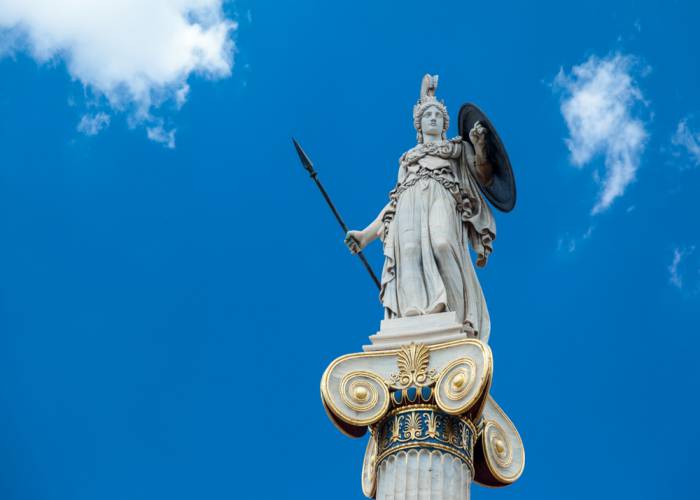Telemachus, a central character in Homer's Odyssey, has an important role in Greek mythology as more than just the son of Odysseus and Penelope. His story is one of growth, wisdom, and heroism. He embarks on a journey to find his father who has been absent from his life since leaving to fight in the Trojan War.
While Odysseus struggles to return home after the war, Telemachus faces his own set of challenges, including dealing with suitors vying for his mother's hand in marriage. Athena, the goddess of wisdom, plays a crucial role in guiding Telemachus on his quest to find his father.
In this blog post, we take a look at Telemachus' parentage, his adventures in searching for his father and the impact of Odysseus’ absence on his upbringing. Without further ado, let’s get straight to the point.
The Lineage of Telemachus: Son of Odysseus and Penelope

Farewell of Telemachus and Eucharis - Credits: everettcollection/ Canva
Parentage and early life
Telemachus was born to Odysseus and Penelope in Ithaca, before the Trojan War. Odysseus was a Greek hero, famous for his role in Greek mythology, while Penelope was a virtuous and loyal queen. As a child, Telemachus was raised by his mother, who instilled maternal wisdom in him while his father fought in the war.
Growing up in Ithaca, his early life was mostly spent within the palace, learning about his heritage and understanding his dual legacy, from both his father and mother. As he reached manhood, Telemachus became increasingly aware of his parents' importance and the responsibility that he would one day bear.
Impact of Odysseus' absence on his upbringing
Odysseus' prolonged absence due to the Trojan War and his subsequent odyssey had a significant impact on Telemachus' upbringing. Without his father's guidance, he relied on maternal wisdom and his father's loyal friends for support. His mother, Penelope, remained steadfast in her loyalty to Odysseus, teaching Telemachus the value of patience and resilience.
In the years that followed, Ithaca became overrun with suitors seeking Penelope's hand in marriage, believing that Odysseus was dead. Despite the hardships and challenges, Telemachus managed to maintain his composure and displayed wisdom, patience, and courage - traits inherited from both Odysseus and Penelope.
He eventually embarked on a journey to find his father and restore order to their kingdom, embracing the paternal legacy bequeathed to him.
The Call to Adventure: Telemachus' Quest Begins

Telemachus finds himself troubled by the presence of aggressive suitors vying for his mother's hand in marriage. This predicament sets the stage for his own journey in the ancient Greek epic, the Odyssey.
In this critical phase of his life, Telemachus is introduced to the goddess Athena, who disguises herself as his father's old friend, Mentes. In their very first encounter, Athena plants the seed of adventure within the young prince, telling him his father is still alive.
The characteristics of Telemachus' quest are as follows:
- Mentorship and Guidance: Throughout his journey, Athena serves as his mentor and protector, assisting him in various forms, whether it's supporting his decisions or providing him the tools for his success.
- Facing Challenges: Telemachus must overcome the resistance from suitors, elders, and even his own mother Penelope, who are hesitant about him embarking on this perilous journey.
- Growth in Character: As the son of a hero, Telemachus learns to embrace his youth, assert himself, and establish his own identity and responsibilities as a rightful prince. His tale highlights the importance of resilience and self-discovery.
Telemachus' journey eventually leads him on a quest for knowledge about his father, Odysseus' whereabouts, and ultimately a reunion with his long-lost father. By navigating the challenges and obstacles in his path, he gradually emerges as a more knowledgeable and confident individual.
